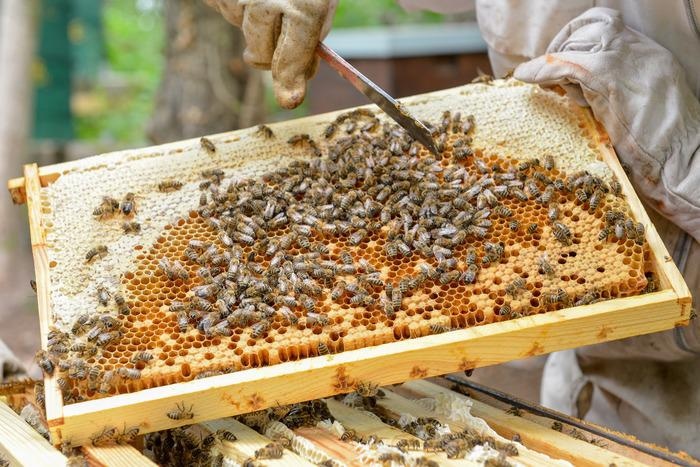Reviewed by Danielle Ellis, B.Sc.Jun 2 2022
A hazardous strain of the deformed wing virus is spreading over the world. Honeybees are infected with the virus, which causes their wings to atrophy and the animals to die. The new form of the virus, which has already displaced the original strain in Europe, is expanding to other parts of the globe and destroying entire bee colonies.
 A honeycomb from a beehive. Image Credit: Uni Halle / Markus Scholz
A honeycomb from a beehive. Image Credit: Uni Halle / Markus Scholz
An international team of researchers headed by Martin Luther University Halle-Wittenberg (MLU) evaluated data on the spread of viral variations over the past 20 years and found this.
The study appeared in the “International Journal for Parasitology: Parasites and Wildlife.”
The parasitic Varroa mite transmits the Deformed Wing Virus (DWV).
“These mites not only transmit viruses between honeybees, but they also eat the bees’ tissues,” clarifies Professor Robert Paxton, a bee researcher from MLU. For many years, he has been researching the spread of numerous illnesses in honeybees and wild bees.
“Deformed wing virus is the biggest threat to honeybees,” adds Paxton.
The virus’s initial strain (“DWV-A”) was identified in Japan in the early 1980s, whereas the new version “DWV-B” was found in the Netherlands in 2001.
Our laboratory studies have shown that the new variant kills bees faster and is more easily transmitted.”
Robert Paxton, Bee Researcher, Martin Luther University Of Halle-Wittenberg
The zoologist’s team wanted to see how common the new variation had become in nature. The scientists used the NCBI dataset to examine over 3,000 records for honeybees, large earth bumblebees, and Varroa mites. The datasets offer information on the viruses’ genetic material.
In addition, they looked into the earliest empirically validated references to the “DWV-B” version for several countries.
Our analyses show that the new variant has already gained a foothold in Europe and that it will only be a matter of time before it is the dominant form around the world.”
Robert Paxton, Bee Researcher, Martin Luther University Of Halle-Wittenberg
In the 2000s, the new variation was mostly identified in Europe and Africa, the honeybee’s native land. It was found in the early 2010s in North and South America, and in Asia in 2015. Except in Australia, the viral variety has now been found on all large landmasses. This could be due to the Varroa mite’s inability to spread widely there, according to the scientists.
Virus evidence was also discovered in samples collected from huge earth bumblebees.
Whether the virus will have similarly devastating consequences in bumblebees and other wild bees remains uncertain. So far, commercial bumblebee colonies infected with the virus are not dying at a significantly higher rate.”
Robert Paxton, Bee Researcher, Martin Luther University Of Halle-Wittenberg
Honeybees can be protected from the Varroa mite and the virus in a variety of methods.
“The most important thing is to pay attention to hygiene in the hive. Here, simple measures can help protect one’s colony from Varroa and wild bees that no one else is looking after,” concludes Paxton.
Honeybees serve an important role in fruit yields and biodiversity preservation as pollinators of several wild and domesticated plants. Experts from all across the world are concerned about the disappearance of honeybee colonies.
Source:
Journal reference:
Paxton, R. J., et al. (2022) Epidemiology of a major honey bee pathogen, deformed wing virus: potential worldwide replacement of genotype A by genotype B. International Journal for Parasitology: Parasites and Wildlife. doi.org/10.1016/j.ijppaw.2022.04.013.